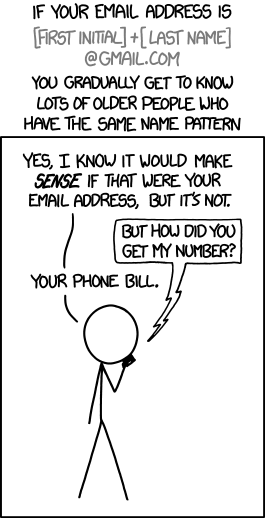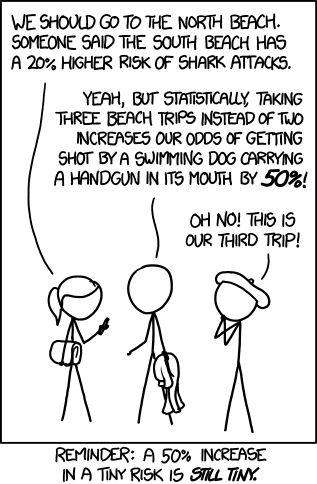 Writing at Salon, "New York
based journalist and consultant to progressive causes" Tom Watson
objects to the anti-surveillance Stop Watching Us rally,
scheduled for October 26 in Washington, D.C., because it commits
the unforgivable sin of reaching across partisan lines. The fatal
flaw of this gathering, says this breathless correspondent, is that
it includes (gasp) libertarians! Much better to keep objections to
the NSA and intrusive
snoopiness as a private club for those who, he insists, really
care about privacy. "The path to NSA reform so clearly lies inside
the Democrats’ big tent," he writes, "and runs through its liberal
wing."
Writing at Salon, "New York
based journalist and consultant to progressive causes" Tom Watson
objects to the anti-surveillance Stop Watching Us rally,
scheduled for October 26 in Washington, D.C., because it commits
the unforgivable sin of reaching across partisan lines. The fatal
flaw of this gathering, says this breathless correspondent, is that
it includes (gasp) libertarians! Much better to keep objections to
the NSA and intrusive
snoopiness as a private club for those who, he insists, really
care about privacy. "The path to NSA reform so clearly lies inside
the Democrats’ big tent," he writes, "and runs through its liberal
wing."
Stop giggling. That's so not polite.
Writes Watson:
This is a vital cause, and I agree with it.
Yet I cannot support this coalition or the rally. It is fatally compromised by the prominent leadership and participation of the Libertarian Party and other libertarian student groups; their hard-core ideology stands in direct opposition to almost everything I believe in as a social democrat.
The Libertarian Party itself – inaccurately described by Stop Watching Us as a “public advocacy organization” – is a right-wing political party that opposes all gun control laws and public healthcare, supported the government shutdown, dismisses public education, opposes organized labor, favors the end of Social Security as we know it, and argues in its formal political manifesto that “we should eliminate the entire social welfare system” while supporting “unrestricted competition among banks and depository institutions of all types.”
Yet my progressive friends would take the stage with the representatives of this political movement? Why? The loss is much greater than the gain. Organizers trade their own good names and reputations to stand alongside – and convey legitimacy to – a party that opposes communitarian participation in liberal society, and rejects the very role of government itself. And their own argument for privacy is weakened by the pollution of an ideology that uses its few positive civil liberties positions as a predator uses candy with a child.
Later, Watson goes on to describe libertarians as really authoritarian because "it’s always about the man on the balcony" whatever the fuck that means. Cuz progressives don't really mean it when they go all control-y, but libertarians secretly do because Hayek hearted Pinochet. But we already got that Watson doesn't like us from the whole child-predator thing.
The true larf riot comes with this tidbit, apparently written after Watson awoke from a stroke that erased the last decade. Or three.
Going “all in” with the libertarian purists is a fatal and unnecessary compromise; reform is clearly needed, but the presence of anti-government laissez-faire wingers at the beating heart of the privacy movement will surely sour the very political actors that movement desperately needs to make actual – and not symbolic, link bait – progress in its fight.
I speak of the progressive movement and the Democratic Party, of course.
For those whose feet still touch the ground, the path to NSA reform so clearly lies inside the Democrats’ big tent – and runs through its liberal wing. And because we are a liberal republic, whose central government is not leaving the landscape anytime soon (the libertarians’ fondest goal), change must also run through an elected Congress.
Democrats? Sen. Dianne Feinstein (D-Your Cell Phone) took to the pages of USA Today to defend NSA surveillance as recently as yesterday. Sen. Harry Reid (D-Your Email In Box) called Edward Snowden a "traitor" for revealing the NSA's excesses. And President Obama, who is, in fact, a Democrat, loves him some NSA surveillance.
 So, of course do Republicans.
Rep. John Boehner (R-Orange)
shares Reid's sentiments about Snowden. Sen. Lindsey Graham
(R-The Inquisition)
digs the NSA, and so does
Sen. John McCain (R-Get Off My Lawn).
So, of course do Republicans.
Rep. John Boehner (R-Orange)
shares Reid's sentiments about Snowden. Sen. Lindsey Graham
(R-The Inquisition)
digs the NSA, and so does
Sen. John McCain (R-Get Off My Lawn).
The whole establishment, Democrat and Republican, favors an intrusive surveillance states. It's left to mavericks like Sen. Ron Wyden and Sen. Rand Paul to provide opposition to the NSA that's affiliated with either major party. That's why a coalition reaching across partisan lines, and certainly not restricting itself to one or the other compromised and deeply authoritarian major party, is necessary to press for change. And libertarians, with our inherent suspicion of the state, are a natural part of such a coalition.
That inherent suspicion may explain why Edward Snowden, before revealing the NSA's shenanigans, contributed money to libertarian-Republican Ron Paul's political efforts. He was also called "a libertarian hero"—at Salon.






 Yesterday, I
Yesterday, I 
 The Obama Administration has been publicly
pushing the idea that questions about the administration’s actions
and truthfulness in regards to last year’s attack on the Benghazi
consulate was a
The Obama Administration has been publicly
pushing the idea that questions about the administration’s actions
and truthfulness in regards to last year’s attack on the Benghazi
consulate was a  On Friday a New Orleans homeowner was
On Friday a New Orleans homeowner was  While the Department of Justice is
While the Department of Justice is  Justin Carter, 19, has been in
jail since March 27, when the Comal County (Texas) teen was
arrested for making an off-color joke to a friend about a
Justin Carter, 19, has been in
jail since March 27, when the Comal County (Texas) teen was
arrested for making an off-color joke to a friend about a 

 This week the Ohio House of Representatives
unanimously
This week the Ohio House of Representatives
unanimously  When George W. Bush and the GOP
ran the government, Republicans were far more likely to support the
kind of NSA surveillance that's just be exposed. Unsurprisingly,
with Barack Obama in the White House, Democrats are now more fond
of government snooping than they used to be.
When George W. Bush and the GOP
ran the government, Republicans were far more likely to support the
kind of NSA surveillance that's just be exposed. Unsurprisingly,
with Barack Obama in the White House, Democrats are now more fond
of government snooping than they used to be.

 Spend enough time online, and
you'll find someone who believes that because the National Security
Agency exists solely to keep Americans safe, it would never do
anything it absolutely didn't need to do in order to fulfill its
mission. "Even if it did," argue defenders of government spying, "I
have nothing to hide."
Spend enough time online, and
you'll find someone who believes that because the National Security
Agency exists solely to keep Americans safe, it would never do
anything it absolutely didn't need to do in order to fulfill its
mission. "Even if it did," argue defenders of government spying, "I
have nothing to hide."  As
As